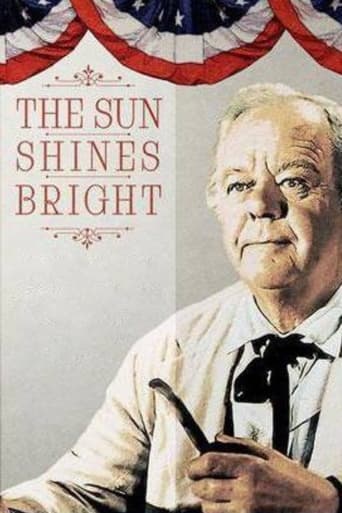JoeytheBrit
It would be nice to be able to discuss this film without having to refer to its politically incorrect depiction of blacks, but it's impossible to do so. The film, which is a remake of director John Ford's own Judge Priest from the 30s (in which Will Rogers played the title role), must have seemed curiously dated even when it was released, and feels like it was made in the early forties rather than the mid-fifties. Whether that's because of its outdated attitude towards blacks and the presence of slow, scratchy-voiced Stepin Fetchit is open to conjecture – it could just be that the fog of nostalgia that hangs over the entire work is the reason.Charles Winninger makes an amiable old judge whose quiet wisdom puts to shame the hypocritically puritanical attitudes of his small town's people and the racist assumptions of an unruly lynch mob out to hang a blameless teenage Negro. The storyline is kind of meandering, reflecting the apparently relaxed pace of life in the turn of the century Deep South, and you do really get a taste of Southern gentility – whether accurate not. Its various sub-plots are linked together by the judge's bid for re-election, which serves to emphasise the importance of standing by one's principles no matter what the possible personal costs may be. Of course, the truth is Billy Priest is too good to be true, but I don't think anyone was out to make him a more realistic figure in this milieu than Santa Claus or God would have been.John Ford's notorious sentimentality is in danger of becoming cloying at times, but he just about manages to rein it in at key moments. The film says as much about Hollywood's take on American social attitudes in the mid-50s as it does about the same in the Deep South at the turn of the century, which isn't in itself a bad thing. I suppose it's even possible that one day films like this will be shown in classrooms to demonstrate the gigantic positive strides made in the cause of racial equality in the latter half of the 20th Century. Better that than they are wilfully ignored in the name of political correctness.
zetes
I feel like I have to walk over eggshells to say anything at all about this movie, Ford's remake of his earlier, 1934 Will Rogers vehicle Judge Priest. Both films have some hard-to-take racial stereotypes, first and foremost in the personage of Stepin' Fetchit, who, along with Butterfly McQueen, stand as the ugliest black performers of their era. But the offense doesn't stop there. The Sun Shines Bright contains a plethora of objectionable material, some of which probably well deserves to be objected to, and some of which will be construed as hateful by modern audiences when it really isn't. The story concerns an aging judge running for re-election in Kentucky, somewhere near the Mason-Dixie line around the turn of the 20th Century. Judge Priest is a Confederate veteran, as are many of his friends. They celebrate this with open nostalgia, although there isn't really any hatred between them and those in the county who fought for the North. The main story of the film is of Judge Priest's deep humanity, and his love for all people. There are two main plot threads, that of a lynch mob out to hang a young black man and that of a dying prostitute, who happens to be the long absent mother of one of the town's outstanding young women. Priest must defend the black man from the mob and arrange a dignified funeral for the prostitute, even though it very well could cost him the election. The film's treatment of African Americans seems quite more in tune with the 1930s than the 1950s. The original film, Judge Priest, might be less offensive, actually. Yes, the blacks in that film were caricatures. However, the star of that film, Will Rogers, who famously never met a man he didn't like, seemed more like a friend to the African Americans around him, including Stepin' Fetchit and Hattie McDaniel. He even sings with McDaniel at one point. Priest in that film seems something of an outcast from the whites; they respect him, even love him, but he is not exactly one of them. In The Sun Shines Bright, Priest spends most of his time with his fellow veterans. Stepin' Fetchit is there most of the time, too (he even attends a veterans' meeting with a gray cap on his head), but he and Priest don't seem like buddies. Fetchit is his servant. Even though Fetchit and McDaniel were also his servants in the earlier version, like I said, they seemed more like friends. When Judge Priest helps out the African Americans of his county in the later version, his actions seem more patronizing than friendly. He is the father figure to every black person. At the end of the film, it almost seems like they're worshiping him. Worse yet, when the election is held, we see everyone vote except for the blacks. It's not even implied that they have already voted. Despite these very important problems, The Sun Shines Bright is a very good film that would indeed inspire a deep love for humanity long before it would ever inspire bigotry. I would never dismiss the problems of the film, but I think that what it accomplishes is much more valuable than what most would damn it for. 9/10.
davnimm1956
This film although rarely shown, has one beautiful vignette after another. Although a remake of Fords JUDGE PRIEST,we see a small town,where everybody is brought together by Charlie Winninger who portrays Judge Priest. The scene where he campaigns for the decent burial for the Prostitute who has come home to die, just might be one of the finest sequences ever put on film. A film only Ford could pull off, and does!! Don,t miss this one.



